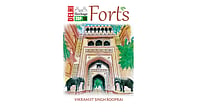Selina Hossain’s Charcoal Portrait could quite easily have been a story about the ‘birangonas’, the raped heroines of 1971. Instead, she tells the story of a search for identity. Dulal, a ‘war child’, has the benefit of knowing who his mother is, unlike many others who were torn from their homes during the Bangladesh War. He arrives in Dhaka from Germany with a slip of paper, totally lost and meets the artistic Ranjan and his autorickshaw. The two form a mystic bond and Ranjan takes Dulal under his wing.
Ranjan is on the run from the police because of the death of his wife. Fate brings him to a village near the tea gardens. There the little granddaughter of the stationmaster tells him that she loves him like salt—the King Lear legend transposed to Bangladesh—and from ‘kaku’, or ‘uncle’, calls him father. Ranjan, too, is looking for something—in his case an identity. The fact that the village is by a railroad track underlines the passing of life and people like trains in the night. Through teaching art Ranjan tries to help children to find themselves—the first thing he teaches them to draw is their mothers—and the mother narrative links him to Dulal.
Hossain then shifts from Dulal’s quest to take us to the world of bonded labour in the tea gardens. A turbulent world of indentured labour where the men are soaked in cheap booze to make them forget their oppressive masters. There, Chaitirani’s husband Kukuwan is accidentally shot in one of the numerous protests called by the labourers. Hossain paints a picture of almost unbearable harshness, lives soaked in blood and maimed by the jaws of factory machines. The tea garden workers do not belong there and are looking to return to their own homeland but their quest is hampered by extreme poverty. For them life is a continual struggle, much as it was for the Bangladeshis at the hands of the Pakistani soldiers during the War of Liberation—except that tribal women in the gardens were doubly exploited, first by the Bengalis who ran the gardens and then by the Pakistanis.
Hossain’s narrative focus is on the mother figure—the mother is the earth as Chaitirani is the clay from which she hopes new clans will spring, though that ardent hope seems to be blighted. Tea garden societies are usually matrilineal, so that gives her an advantage and her women struggle against greater odds than her male characters.
Hossain’s story-telling technique shifts from one set of situations to another—a layered narrative that gradually unravels through a reading of the text. Ultimately, it is a story that could quite easily be summed up in the words ‘ma, mati, manush’—the slogan of a dominant political party across the border, in West Bengal.
The translator throws in touches like Hans Christian Anderson fairy tales, ‘swan uncles’ and faces that ‘beam up’, which has the reader wondering whether they were part of Hossain’s original narrative, since Tirna Chatterjee confesses that she has taken ‘liberties’ with the text to appeal to the modern reader.


























